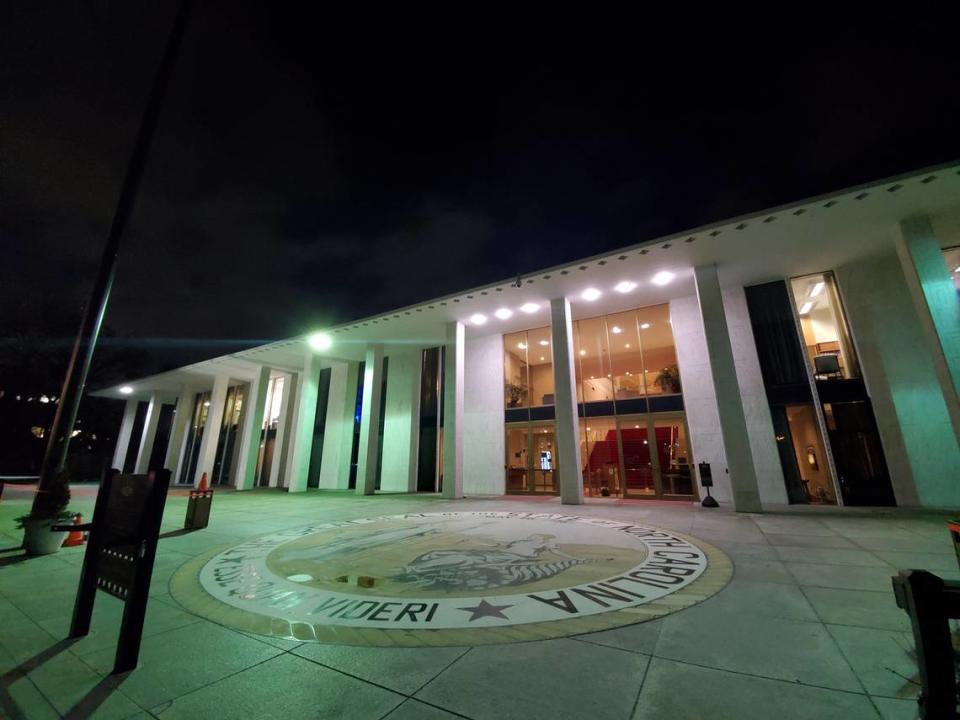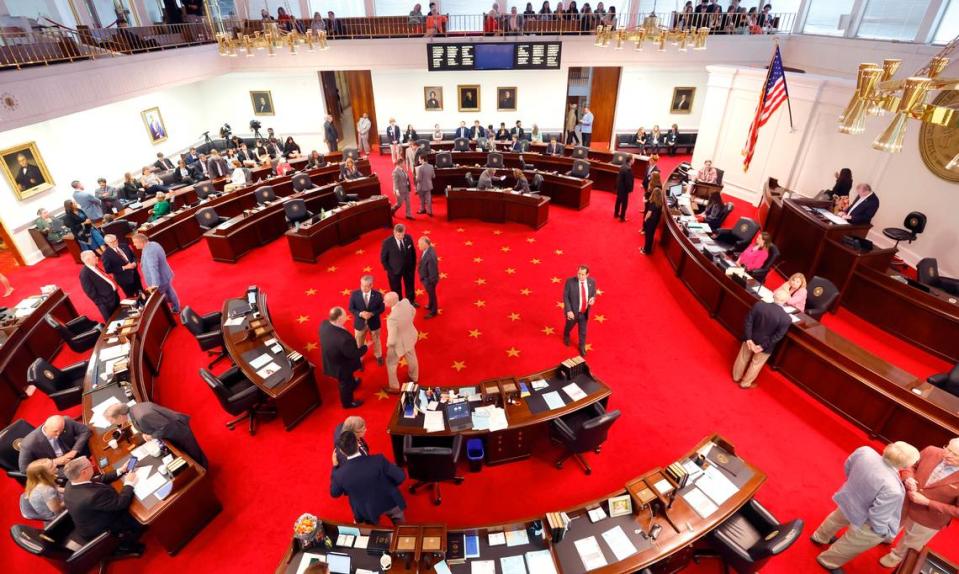NC lawmakers are chosen by the people, but the people can’t see all that they’re doing
North Carolina’s motto is “Esse Quam Videri,” which means “To Be, Rather than to Seem.” A new law allows state government to be less transparent than the motto suggests it should be.
The state public records law now exempts state lawmakers from following it. That means millions of taxpayers have less access to what 170 members of the General Assembly — put there by voters — are doing. That includes what goes into the decision-making by those legislators about how they spend taxpayer money and draw districts for candidates.
The change, made in the state budget written by Republican lawmakers and allowed to become law in fall 2023 by Democratic Gov. Roy Cooper, means it is entirely up to lawmakers themselves to decide what public records, if any, to reveal.
Brooks Fuller, who leads the North Carolina Open Government Coalition and is a professor at Elon University, called the new law “a massive backslide in public access to information.”
He said the new law means that “there’s absolutely no incentive to share information with the public unless it benefits the specific legislator.”
Some lawmakers are still providing public records upon request, The News & Observer found.
But because lawmakers are the ones who get to decide how to respond to a request, they can share what shows them in the best light.
What you might be missing
How does this impact you? Public records have been used to tell you how your tax money is spent, expose corruption and explain how the government makes decisions.
Nearly a decade ago, public records obtained by The N&O cast doubt on a House budget proposal’s projections of income from the state lottery that was going to be used for raises. And about 20 years ago, two N&O reporters’ work that focused on the creation of the Lottery Commission, using public records, led to the conviction of a former lottery commissioner for fraud.
Records obtained by The N&O during the drawn-out budget negotiations in 2021 showed what kind of deals were offered, and accepted, between Cooper and the top Republicans, Senate leader Phil Berger and House Speaker Tim Moore.
The N&O requested documents showing budget offers between Berger and Moore this year, before the new law, but so far has not received them.
Those elected officials still subject to public records law, like the governor and local governments, are inconsistent in how quickly they provide public records, and how accessible they are to reporters and the public. But because it is the law, they are compelled to provide them.
Salary data remains public
Under the new law, legislators are no longer compelled to hand over their communications to the public that funds their office space and everything else in the Legislative Building and Legislative Office Building in downtown Raleigh.
One thing that remains public record: salaries.
Most lawmakers draw a salary of only $13,951, but top staff members make six figures.
The N&O obtains regular reports of salary information for General Assembly employees — more than 400 of them — and publishes a salary database. All of them are state employees, which means their salaries are funded by taxpayers. Fuller said because staffers are not legislators, those records are not covered by the new law.
How much do NC General Assembly employees make? What raises did they get? See the data
What the law says
Here’s what the change in the law says.
“Article 17 of Chapter 120 of the General Statutes is amended by adding two new sections to read:
Ҥ 120-135. Legislator is custodian of documents.
(a) Each legislator, while in office and after leaving office, shall be the custodian of all documents, supporting documents, drafting requests, and information requests made or received by that legislator while a legislator.
(b) A legislator, while in office or after leaving office, shall not be required to reveal or to consent to reveal any document, supporting document, drafting request, or information request made or received by that legislator while a legislator. “
And there’s more:
Ҥ 120-137. Legislative privilege.
Nothing in this Chapter nor in Chapter 132 of the General Statutes shall be construed as a waiver of the common law of legislative privilege or legislative immunity by a legislator or former legislator. A legislator or former legislator may assert the common law of legislative privilege or the common law of legislative immunity in all instances.”
Redistricting, investigations and top leaders
The budget also exempts documents related to redistricting from public records law. That’s especially important because the N.C. Supreme Court ruled last year that partisan gerrymanders are allowed, meaning that the majority party during mapmaking — currently Republicans — can draw lawmaker districts to suit their party, with some limitations.
Also now exempt are records from Gov Ops, or the Joint Legislative Commission on Governmental Operations, a group that answers to the Senate leader and House speaker of the majority party. Gov Ops’ power was also expanded in the 2023 budget.
Fuller said that in general, “you cannot trust that documents that come out of an elected leader’s office are the entire picture of any public policy question.”
Unless that changes because of a legal challenge or new legislation, “there’s no mechanism for compelling complete and total truth in the form of producing documents,” he said.

How does NC compare to other states?
The National Conference of State Legislatures, which has a breakdown of each state’s public records law, notes that all 50 states enacted laws requiring at least some government records be public.
Most states, NCSL reports, maintain that the state legislature is subject to the same public records law as other government entities, with some exceptions.
Fuller, the Elon professor, said there have been “backslides in legislative accountability” in Texas, Arkansas and Tennessee, which also have Republican statehouse majorities like North Carolina. Those states have blanket legislative privilege like North Carolina, Fuller said.
Florida, for example, has a constitutional right to access public records, which North Carolina does not. If North Carolina did, there could be a lawsuit calling the change unconstitutional.
But Fuller doesn’t see a way to reverse the law in the courts.
“The only people that can hold the legislature accountable are their constituents in the ballot box, the press through dogged reporting, and telling stories that affect the lives in North Carolina.”

Bipartisan opposition to the change
While Republicans control the legislature, and hence used their power to change the law, opposition to the change has come from both Democrats and Republicans.
The conservative think tank the John Locke Foundation has urged lawmakers to overturn it, and led a coalition of news organizations that oppose it as well.
That includes the North Carolina Press Association, of which The N&O is a member.
The governor and other members of the Council of State, elected by voters statewide, are still subject to public records law.
Bill Graham, an attorney and businessman running in the Republican primary for governor, doesn’t think that legislators should get different treatment under the records law.
“All elected officials should be held to the same standards. Failure to do so only undermines public trust,” Graham told The N&O in January.
The N&O requested calendars from the three Council of State members who are running to be the next governor: Lt. Gov. Mark Robinson and State Treasurer Dale Folwell, who are both Republicans, and Attorney General Josh Stein, a Democrat. All three responded with their schedules, but if they were state lawmakers, nothing would compel them to do so, at least not in the same way.
Folwell, a former House member, criticized the public records law change last fall, saying it “creates a system without standards or accountability.” Folwell is arguably the most transparent Council of State member when it comes to public records, with an office known for quickly responding to records requests. He won a Sunshine Award from the Open Government Coalition in 2022.
Through a campaign spokesperson, Robinson declined to comment on the change in public records law.
Stein, a former state senator, said the change in the law is evidence of the General Assembly’s “desire to remove themselves from accountability to voters,” noting that redistricting is now exempt from the law.
“They don’t want us to know the motivations they had — when they change election laws or when they change legislative districts,” Stein told The N&O last month. Stein supports changing the law back if he becomes governor.
“I think the records belong to the people, and that people have a right to them. And the legislature is saying that rule applies to all of state government, ‘save us, we are somehow different,’” Stein said about the lawmakers.
The gubernatorial primary is March 5.
The 2024 legislative short session begins in April. No current Republican lawmaker has called for a change in the records law.

